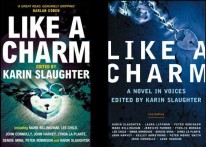


February 2026
Dig This
Back in San Antonio, many decades ago, one of the newspapers used to rely on carrier pigeons to transmit film from big football games. Or so the story goes; it's much too good to check out, especially when one needs a pat transition. You see, filing a monthly letter feels about as cutting edge as carrier pigeons these days, given the advent of blogging. Ideas come and go so quickly here, to paraphrase Dorothy Gale. I don't think I could keep up even if I tried. If you yearn for immediacy, click here, here, here or here.
These formidably quick writers are among those who, in the past month, analyzed Ben Yagoda's Salon piece on detective fiction, reported Otto Penzler's views on cats and recipes in mysteries, and sounded the alarm at Bill Keller's assertion that the New York Times Book Review should skew to reviewing even more nonfiction because nonfiction is about "ideas," and fiction, by implication, isn't. At the same time, Keller seems tempted to the let the NYTBR write more about idea-free "airport" fiction. Apparently, the Times has to do something to get the youngsters reading, and lord knows they're all too worn out from online dating and instant-messaging to concentrate on anything weighty. Two questions for Keller: Have you been in an airport bookstore lately? Even the cheesiest ones have a decent selection of hifalutin' trade paperbacks. And was it hard, alienating literary writers, popular writers, and their audiences with one sweeping generalization, or did it just come off your head natural, as the late Johnny Ketchum used to say?
As noted, those stories have been exhaustively covered in the blogs. So allow me to focus on two more casual slights that went zinging by last month, gray-area slurs that didn't attract much attention. Both are from the January 18th edition of the New York Times.
Alessandra Stanley, writing in Arts & Leisure about her affection for "Monk," noted:
"Edmund Wilson, in his famously grouchy 1945 essay, 'Who Cares Who Killed Roger Ackroyd?' dismissed detective novels as a vice ranking 'somewhere between smoking and crossword puzzles.' Actually their virtue is that they fit neatly between the two: a 'Matlock' episode or a Nero Wolfe mystery can be enjoyed more passively than a crossword puzzle (a puzzle, no matter how easy, requires a pencil and full participation), but it soaks up more time and attention than a cigarette."Now I enjoy crossword puzzles, having recently worked my way up to completing the Sunday Times puzzle solo. But I can do them while watching television or listening to the radio, which simply isn't possible while reading Nero Wolfe, much less necessary. Rex Stout not only demands one's full attention, he earns it. And then there's the assertion that all mysteries are mere puzzles that are wrapped up upon solution. Maybe in Cabot Cove, but not in today's best crime novels.
I was even more troubled by this tossed-off phrase in Robert Macfarlane's review of Walter Mosley's The Man in My Basement, referring to Mosley's crime stories:
"The edges of these novels frayed into something more interesting than the mystery genre normally permits . . . "Permits? Permits? How is it that those who disdain the crime genre always seem to have some official rulebook that its practitioners have been denied? Even the use of "frayed" seems loaded, suggesting that Mosley's achievements are unintentional.I think it's time for a truce among writers, whatever their chosen genres. I'll start by apologizing for that remark about literary novelists not being able to plot. Such internecine squabbles always remind me of a passage in Lisa Alther's Original Sin. It takes place at a 1960s-era women's group that begins coming apart at the seams because each woman wants it to be more tailored to her demographic niche -- single, married, white, black, straight, gay. The discussion sends one participant into a tirade.
"What I think is this: You confront a carrot with a potato, and it'll probably insist, 'Hell, no, I ain't no potato. Honey, look at me. Hell, I'm orange, and long and thin. And lookee here, I got me this lacy green top.' Stops them seeing they're all in that garden together, all gonna get dug up come fall."
(© 1981, Lisa Alther)Or remaindered.

News
Over the years, several readers have asked me to develop a Baltimore tour for this web site, but my famed laziness has gotten in the way. Washington Post travel editor K.C. Summers stepped up nicely, however, in this piece. Everyone agrees that the single most flattering sentence is the last one in the third paragraph. Everyone doesn't agree that it's true, mind you, just that it's flattering.
And I'm happy to announce that Every Secret Thing has been nominated for the Hammett Award by the International Association of Crime Writers. Although named for one of the foremost practitioners of the private-eye novel, this prize was created in 1992 to recognize crime fiction in general. And although Hammett is usually linked to San Francisco in the public imagination, he was born in St. Mary's County, Maryland, and lived in Baltimore, where he worked as a Pinkerton agent in a building with a motif of black birds on its exterior. The building, which is
still standing -- albeit with the birds now painted gold -- is known as the Continental Building. This year's Hammett winner will be announced at Bouchercon in Toronto. See you there.
Like A Charm
I have a story in the upcoming serial novel Like A Charm, coming out in Feb. in the UK and May in the US. To enter a contest to win a limited edition, collectors item hardcover -- signed by all of the authors -- visit the Like A Charm website.

